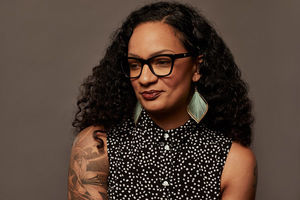Quick and Dirty on Communication and Inviting Writers to Do All the Things
By Chelene Knight
It’s a beautiful thing when writers make money. It’s an incredible feeling to open up your email and see all the love, invites, and possible project collaborations. This influx is not constant, it comes when it comes, and freelance writers are aware of this. But I wanted to share a bit about how the communication (or lack thereof) around how to ask someone to do work can actually cause more anxiety and stress than the project itself. I am all about transparency and sharing resources. I consider this to be a tool, a kind whisper—a casual conversation between friends.
What brought on the desire to write about communication? Over the past two years (well, at least since I’ve started tracking my time), I’ve noticed that I spent a lot valuable time in my already jam-packed day pressing organizations for more information whenever I’d get a cryptic message about the possibility of doing an event or collaborating on a project. I can’t understand why some folks don’t—or won’t—just offer up all of the necessary information in that initial ask.
I’m not completely innocent here either. I’ve been just as guilty of rushing an invite for forgetting details, but I think it’s super important to make sure folks have the information they need and that it’s offered without writers having to do more work to extract it. I’ll give you a prime example, but I’ll preface this by saying that I am not writing this to complain and it’s not coming from a negative place, quite the opposite, actually. Again, think of this as a kind and helpful whisper.
One day last year while doing my usual power-through of my inbox, I came across a message that simply said “Hey, are you interested in doing an event for us?”
End of email.
“First of all, who are you?” I didn’t recognize the name of the organizer or the email address. Second of all, the email was missing at least ten pieces of information—information I need in order to make a decision. It doesn’t have to be a lot, but you have to include things like, what the event is, the date, time, location and accessibility information, scope of work, other collaborators and—wait for it—pay! Please don’t forget to include that last point. If you don’t plan to pay or aren’t able to, this is ok, but it’s so important to relay that information in that first ask. I don’t know what other folks do, but I select my volunteer projects carefully. As someone who is already devoting twenty-five plus hours a week via volunteering time already, another unpaid gig might just be too much.
But all hope is not lost! I’ve also been the lucky recipient of so many well-thought out email invites that contained everything I needed to decide if the project was doable on my end, and if it fit into my scope of work. I am so grateful when invites like these come in [insert a smiling Chelene here].
Quick & Dirty on how to give folks the all the information they need:
If you have the person’s email address, use it.
Social media is sometimes the only contact info you have for a person, but don’t send the invite there unless you know that’s the preferred method of contact. There’s nothing wrong with messaging and saying “Hello I’d like to send you an invite to an event, would you mind sharing your email address so that I may invite you formally?” BOOM. I love it.
Your CanLit News
Subscribe to Open Book’s newsletter to get local book events, literary content, writing tips, and more in your inbox
Treat us like the professionals we are
Allow us enough time to make a decision (you most likely aren’t the only one who has asked us to do work for them, especially if this is how we make a living). If you require an answer in under 24 hours, it’s best to explain why the short notice. Don’t try to sweeten the pot if we’ve mentioned that we aren’t interested in the project. If it doesn’t align with our values or just cause, be kind, don’t press.
Include all pertinent information in the initial ask (if you don’t have all of the info when asking, simply let the person know when you expect to have it)
- what the event is
- who you are
- date and time
- venue and accessibility information
- your tentative role
- event length
- honorarium
While writers and entrepreneurs are busy setting personal and professional boundaries, establishing our non-negotiables, addressing the causes of burnout, and embracing the power of “no,” I think this is a very timely point for me to make. Whether it’s a speaking engagement, judging a contest, doing a reading, or presenting, it’s best to go through the proper channels and use these best practices around communication.
This is not all one-sided. Artists can help make communication a little smoother, too. There have been so many times where emails have landed in my junk box, or I’ve forgotten to reply etc. But when I do respond, I’ve adapted a three key practices to make sure that I am being as helpful as possible, especially if I am turning down an event:
- When turning down an event because of a scheduling conflict, always try to suggest someone else. This helps the organizer, and I pay forward an opportunity.
- If I can’t respond right away, open the email send a quick line letting them know when you will get back to them in more detail.
- If there is something specific I’ll need to make this partnership happen, I speak up and share this in my reply.
So there you have it. Nothing fancy; nothing groundbreaking. Just super simple and easy ways to make communication a little bit more fluid. When I open up my inbox, click on that email and see everything I need, I begin to breathe a bit easier and chances are I’ll have more time and energy to get excited about these tentative projects. I want to say goodbye to feeling the anxiety related to having to press and dig for more information. In my experience, these small shifts in thinking and communication can make all the difference.
The views expressed by Open Book columnists are those held by the authors and do not necessarily reflect the views of Open Book.
Chelene Knight is the author of the poetry collection Braided Skin and the memoir Dear Current Occupant, winner of the 2018 Vancouver Book Award. Her essays have appeared in multiple Canadian and American literary journals, plus the Globe and Mail and the Toronto Star. Her work is anthologized in Making Room, Love Me True, Sustenance, The Summer Book, and Black Writers Matter.
The Toronto Star called Knight, “one of the storytellers we need most right now.” In addition to her work as a writer, Knight is managing editor at Room, programming director for the Growing Room Festival, and CEO of #LearnWritingEssentials. She often gives talks about home, belonging and belief, inclusivity, and community building through authentic storytelling.
Knight is currently working on Junie, a novel set in Vancouver’s Hogan’s Alley, forthcoming in 2020.




